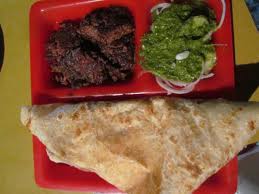Tunde ke kabab
Tunde ke Kabab is a renowned variety of kebab originating from Lucknow, a city in the northern part of India. This delicacy is celebrated for its unique taste, soft texture, and the rich history it carries from the era of the Nawabs of Awadh. The name "Tunde" refers to the one-armed chef, Haji Murad Ali, who is credited with creating this dish over a century ago. The kebab is an integral part of Awadhi cuisine, known for its sophisticated flavors and aromatic spices.
History[edit | edit source]
The inception of Tunde ke Kabab dates back to the late 19th century in Lucknow, under the patronage of the Nawab of Awadh. The story goes that the Nawab, who was fond of kebabs, had lost most of his dentition and thus, desired a kebab soft enough to not require chewing. Haji Murad Ali, despite having lost one arm, took on the challenge and crafted a kebab so tender and succulent that it won the Nawab's heart. This creation not only earned him the moniker "Tunde" (meaning one-armed in Urdu) but also led to the birth of a culinary legend.
Ingredients and Preparation[edit | edit source]
The secret behind the softness and unique flavor of Tunde ke Kabab lies in its ingredients and the method of preparation. The kebabs are primarily made from minced meat, traditionally beef or buffalo, though mutton is also popular. What sets these kebabs apart is the inclusion of over 160 spices, including papaya paste, which acts as a tenderizer, and a mix of special herbs and spices that have been a closely guarded secret, passed down through generations of the Tunde family.
The meat is finely ground and mixed with the spices and papaya paste, then left to marinate for several hours. This mixture is then hand-formed into patties and cooked on a large flat pan or griddle with generous amounts of ghee (clarified butter), which adds to the richness of the kebabs.
Cultural Significance[edit | edit source]
Tunde ke Kabab is not just a culinary delight but also a cultural emblem of Lucknow's rich heritage and the culinary legacy of the Nawabs of Awadh. It represents the syncretic culture of Lucknow, where culinary arts were highly esteemed and patronized by the royalty. The kebabs are a staple at celebrations and a must-try for visitors, embodying the hospitality and the refined tastes of Lucknow.
Legacy and Continuation[edit | edit source]
The original shop established by Haji Murad Ali in 1905, located in the old quarters of Lucknow near the Akbari Gate, continues to operate to this day, now run by his descendants. The popularity of Tunde ke Kabab has transcended local boundaries, leading to the opening of multiple outlets across India. Despite the expansion, the family ensures that the traditional recipe and cooking methods are strictly adhered to, preserving the authenticity of the kebabs.
See Also[edit | edit source]
Search WikiMD
Ad.Tired of being Overweight? Try W8MD's physician weight loss program.
Semaglutide (Ozempic / Wegovy and Tirzepatide (Mounjaro / Zepbound) available.
Advertise on WikiMD
|
WikiMD's Wellness Encyclopedia |
| Let Food Be Thy Medicine Medicine Thy Food - Hippocrates |
Translate this page: - East Asian
中文,
日本,
한국어,
South Asian
हिन्दी,
தமிழ்,
తెలుగు,
Urdu,
ಕನ್ನಡ,
Southeast Asian
Indonesian,
Vietnamese,
Thai,
မြန်မာဘာသာ,
বাংলা
European
español,
Deutsch,
français,
Greek,
português do Brasil,
polski,
română,
русский,
Nederlands,
norsk,
svenska,
suomi,
Italian
Middle Eastern & African
عربى,
Turkish,
Persian,
Hebrew,
Afrikaans,
isiZulu,
Kiswahili,
Other
Bulgarian,
Hungarian,
Czech,
Swedish,
മലയാളം,
मराठी,
ਪੰਜਾਬੀ,
ગુજરાતી,
Portuguese,
Ukrainian
WikiMD is not a substitute for professional medical advice. See full disclaimer.
Credits:Most images are courtesy of Wikimedia commons, and templates Wikipedia, licensed under CC BY SA or similar.
Contributors: Prab R. Tumpati, MD

